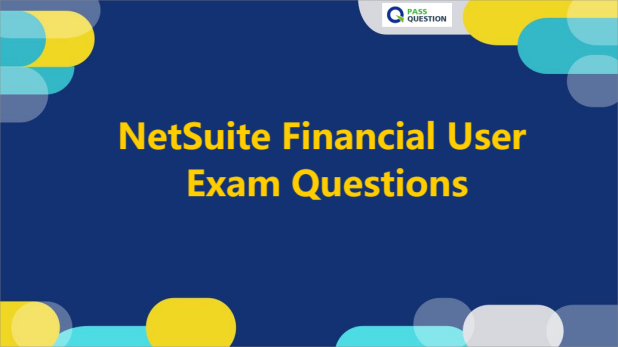NetSuite Financial User Exam Questions
NetSuite Certified Financial User is certified and qualified to use accounting and financial features in NetSuite environments after implementation. One of the best ways to prepare for this certification is by using the latest NetSuite Financial User Exam Questions from PassQuestion. Industry experts have carefully and meticulously designed these questions to cover all the essential objectives that are required for the exam. By using these NetSuite Financial User Exam Questions, candidates can ensure they are well-equipped with the knowledge and skills necessary to pass the exam successfully.

NetSuite Financial User Certification
NetSuite Financial User Certification is intended for individuals who use NetSuite for day-to-day financial operations, such as accountants, financial analysts, bookkeepers, and controllers. It is a way for these professionals to demonstrate their expertise and proficiency in using NetSuite for financial management. Obtaining the NetSuite Financial User Certification can enhance a professional’s resume, increase their job prospects, and demonstrate their commitment to staying up-to-date with the latest technology and best practices in financial management.
The NetSuite Financial User certification confirms individuals have the foundational knowledge needed to navigate NetSuite and understand core NetSuite accounting and finance functionality. This certification is perfect for those who have passed the NetSuite Financial Management course and want to confidently articulate NetSuite’s accounting features, fully understand NetSuite release cycles and master NetSuite standard accounting modules.
Exam Information
Number of Questions: 30 questions
Registration Fee: $150
Retake Fee: $150
Duration: 60 minutes
Format: multiple-choice and matching questions
NetSuite Financial User Exam Objectives
Subsidiaries, Classifications, Chart of Accounts
Accounts Receivable
Billing Schedules
Accounts Payable
Banking and Payment Processing
Journal Entries
Budgeting
Expense Allocations
Financial Reports and KPIs
Period and Year-End Close
View Online NetSuite Financial User Exam Free Questions
1. How can the financial reports be kept separate when tracking finances for two wholly owned but distinct legal entities in one NetSuite account?
A. use separate fiscal calendars
B. use classes
C. use the multi-book accounting feature
D. use subsidiaries
Answer: D
2. Which is recommended for setting up new accounting periods?
A. use one-day year end adjustment period for year-end closing journal entries to retained earnings
B. create accounting period one at a time to avoid multiple open periods
C. Use set-up full year to generate all periods at once for full year
D. set up new year and new quarter at the beginning of the fiscal year
Answer: C
3. How does NetSuite set up a company record when you buy from and sell to the same company?
A. either the vendor or the customer can be set as “Parent of” the other record to link them
B. NetSuite tracks this using the “Other relationship” functions to link the customer and vendor records
C. NetSuite uses a single company record to track this combined relationship
D. NetSuite uses unrelated customer and vendor records to track these
Answer: B
4. Which 3 statements are true about parent accounts in NetSuite (choose 3)?
A. child accounts are created by setting the subaccount of field
B. checking the summary box allows the posting of reversing journal entries to this account
C. parent accounts can be posting or not posting
D. parent accounts are created by setting the “parent of” field
E. checking the summary box on the account record prevents anyone from posting activity to the account
Answer: A, B, E
5. Which statement is true about budgets in NetSuite?
A. budgets must be entered manually
B. budgets can only be created for income and expense accounts
C. budgets hold setting for expenses will prevent overspending
D. Multiple budgets can be created for the same year and criteria
Answer: D
6. Which statement is true about NetSuite Accounts Payable transactions?
A. Vendor Bills must be created from a Purchase Order.
B. Purchase Orders must have a preceding Purchase Requisition.
C. Bill Purchase Orders page will allow you to generate bills from multiple vendors at once.
D. Paying an Unapproved Bill will cause both Bill and Payment to post to the general ledger.
Answer: C
7. Which statement is true about billing a purchase order in NetSuite?
A. All bills must be created from a PO
B. Standalone bills containing inventory line items have no inventory account impact
C. Only approved vendor bills post to the general ledger
D. Vendor bills post to the general ledger, whether approved or not
Answer: C
8. Which statement is true about setting up NetSuite budgets?
A. Copying budgets is not recommended.
B. Budgets can be imported into NetSuite using CSV.
C. Budgets must be created manually in the NetSuite user interface.
D. Budgets can be created for multiple criteria, but only one per parameter.
Answer: B
9. Which statement is true about the Period Close Checklist?
A. This is required for Year-End Close.
B. Tasks may be completed in any order.
C. Customer-specific steps can be added.
D. Tasks displayed depend upon features enabled.
Answer: D
10. Characteristics of purchase order in NetSuite?
A. purchase in the currency the of the vendor’s primary subsidiary
B. purchase order must be in the primary currency of the vendor
C. a purchase requisition is required before creating a purchase order
D. purchase orders have no accounting/GL impact
Answer: D
